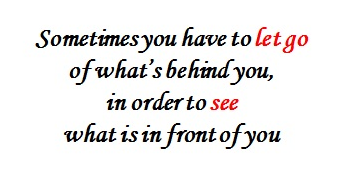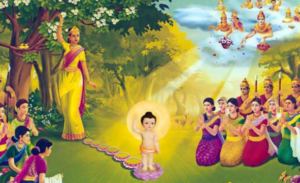Let Go inorder to See
 Seeing is the level of understanding, the state of living reality. If you don’t understand and still lust for this material world, then of course you will not let go. More than half of those who recite Buddha’s name, Amitoufo, are elderly people who are in their seventy, eighty years old. Because they have seen so much. Through their experience, they know all things in the world are just their fantasies. Regardless of living in the right or bad conditions, over a long period of time, everything will be boring. Living with a sense of disgust, not wanting to stay any longer. By this time, they are willing to let go everything.
Seeing is the level of understanding, the state of living reality. If you don’t understand and still lust for this material world, then of course you will not let go. More than half of those who recite Buddha’s name, Amitoufo, are elderly people who are in their seventy, eighty years old. Because they have seen so much. Through their experience, they know all things in the world are just their fantasies. Regardless of living in the right or bad conditions, over a long period of time, everything will be boring. Living with a sense of disgust, not wanting to stay any longer. By this time, they are willing to let go everything.
For young people, they feel the world is very beautiful, still want to live a few more years. Even want to live a few dozen years, a few hundred years more. They could not let go. Can’t let go things, how can a practitioner be able to be achieve greatness.
Teenage should practice seeing the truth, and old people should learn to let go.
Letting go and seeing are two different things, but two are complementary and supportive each others. If you can let go of it a little, then you can see and view the world a little clearer. If you can see a little clearer, you can let go a little more. So what is the best way to practice of letting things go and view the world a little clearer?
In the Sutra, the Buddha teaches us that letting go is to letting go of sorrows, letting go of desire, not letting go of work. Meditation means diligent, not being lazy, don’t sit there like a rock and expect the world to bring you food. In contrary, we have to work hard. If you let go both hard work and practice, then the Buddha doesn’t need to teach his dharma.
In the Diamond Sutra, the prajna paramita
Giving is letting go of greed.
Uphold the precepts is letting go of evil thoughts.
Patience is letting go of the mind of anger and envy
Diligent is letting go of the entertainment, idleness.
Meditation is letting go confusion and uncertainty
Wisdom paramita is seeing through, transparent and clear. So, the prajna Paramita consists of the 4 words: ‘Let go & See through’.
In the Shurangama Sutra and the Flower Adornment Sutra, the ten conducts sometime refer as the ten blessings. In summary, they are the proper conducts of the prajna paramita. The first five conducts teach us of letting go. The last five conducts teach us to see through things
- The conduct of happiness is the practice of generosity of Bodhisattva. not only rejoice oneself, but also make sentient beings rejoice.
- The conduct of benefiting is the Bodhisattva’s precepts, which are all sentient beings’ interests, making them attain to be warm and full.
- The conduct of non-opposition is the method of patience of the Bodhisattva, not contrary to oneself, nor to beings.
- The conduct of endlessness is the method of Bodhisattva’s diligent practice, nor does it make oneself obscure, nor make sentient beings obscure.
- The conduct of freedom from deluded confusion is the meditation of Bodhisattva, body and mind are not scattered and easily confused, because of oneself concentration, conduct is not chaotic.
- The conduct of wholesome manifestation is the wisdom practice of Bodhisattva, realizing the worldly dharma as impermanence, suffering, non-self; and understand the non-worldly dharma that is permanence, joy, self and peaceful.
- The conduct of non-attachment is the method of Bodhisattva means, with the realm of no stagnation, using clever means to save sentient beings.
- The conduct of veneration is the method of Bodhisattva vows, their is great vows, conducts, compassion, great compassion for all beings.
- The conduct of wholesome dharma is the dharma door of Bodhisattva. With their wisdom, they can perform all goodness.
- The conduct of true actuality is the disciplines of the Bodhisattva, words and work are not fake, all true.
In general the ten conducts consists of the 4 words: ‘Let go & See through
If you want to understand all the morality in this dharma realm, it’s not easy. The most important dharma of the cultivator is the to keep the mind clear and free from bad karma, which is also letting go of the three poisons: greed, anger and ignorance. Have to subdued the strong negative ideas. To all sentient beings, you have to be friendly and open heart. Let go all of arguments, it will not create any mouth karma. Because there is no mistake, you can stand high to the fullness, admired by all sentient beings. That is to seeing through all of the Bodhisattvas great conducts.


